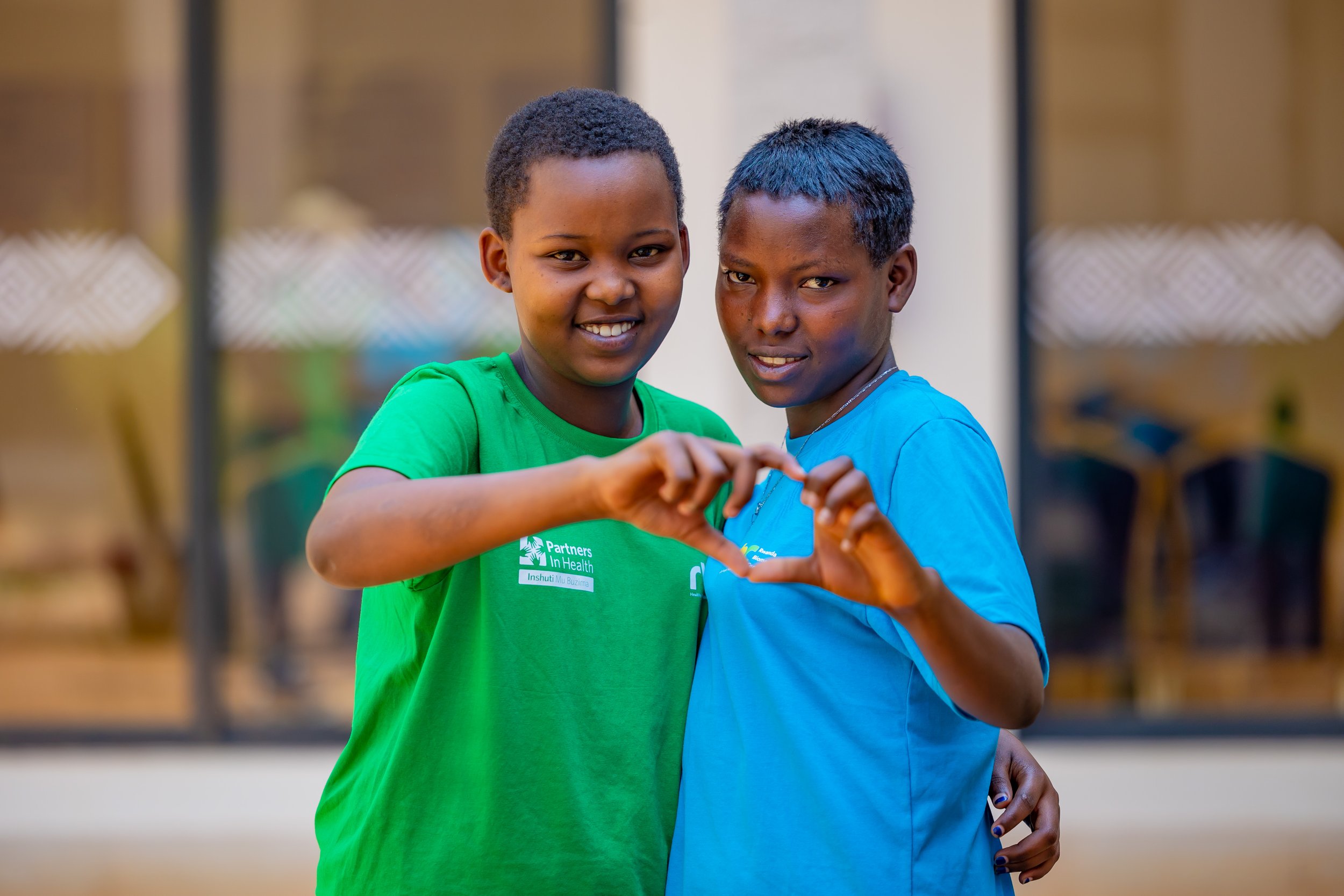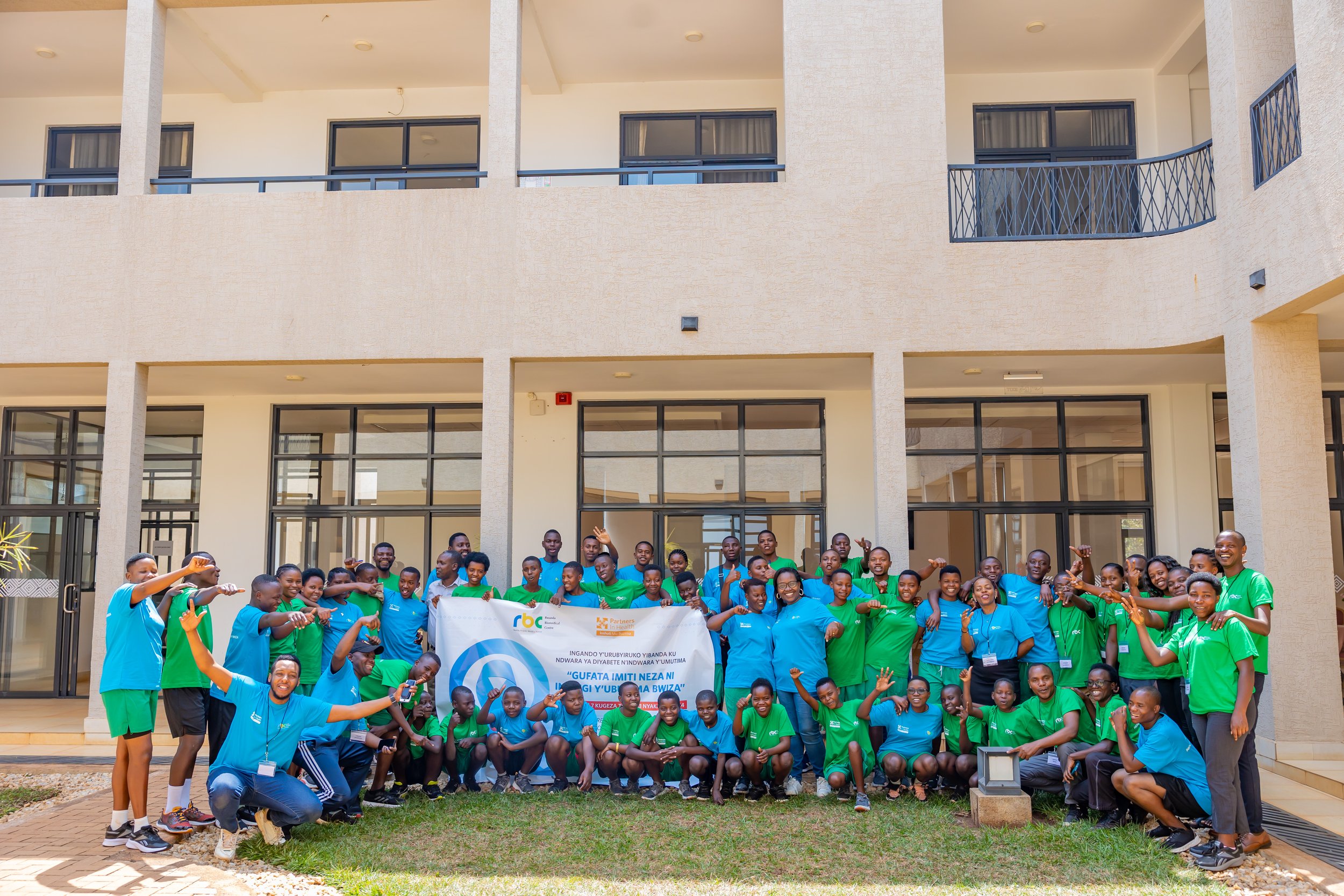Youth Camps Bring Support Beyond Clinical Care
Young people with type 1 diabetes, sickle cell disease, and childhood heart diseases share experiences and support at integrated camps in Rwanda and Zimbabwe.
Participants—including 14-year-old Kirabo Queen (left) and 18-year-old Ishimwe Carine—bonded during an integrated camp held for young people living with type 1 diabetes and childhood heart disease in the Rwamagana District of eastern Rwanda in July. Kirabo and Ishimwe, both of whom live with type 1 diabetes, have expressed their hope for future camps. Inshuti Mu Buzima—as global health nonprofit Partners In Health is known in Rwanda—hosted the camp. (Photo: Courtesy of Gedeon Ngoga)
Camps that bring together young people living with a variety of chronic conditions are showing that the benefits of integrated care can extend far beyond clinical settings.
The first such camps—held this year in Rwanda and Zimbabwe—hosted young people with severe noncommunicable diseases, including type 1 diabetes, sickle cell disease, and childhood heart disease. Facilitated by a multidisciplinary team of nurses, doctors, nutritionists, peer educators, and support staff, the camps offered several days of physical activities, mental health support, nutrition and medication counseling, and, most importantly, solidarity through shared experiences.
“The campers have many things in common,” said Gedeon Ngoga, clinical advisor for the NCDI Poverty Network and the Center for Integration Science in Global Health Equity. “They share low-resource settings, they share stigma at the community level, and they share concerns about the availability of medicines.”
And when they are surrounded by those facing similar challenges, Ngoga added, young people can simply be young people—which can be challenging enough in itself.
“They’re going through normal steps of life, and growing,” he said. “To bring them together is beneficial, so they can uplift each other and see how their values are shared.”
Ngoga attended the Rwanda camp, held in July in the country’s eastern Rwamagana District. Hosted by Inshuti Mu Buzima—as global health nonprofit Partners In Health is known in Rwanda—the camp was held in partnership with the Rwanda Biomedical Centre, Team Heart, the Rwanda NCD Alliance, the Rwanda Cardiac Patient Network, the Medical Students Association of Rwanda, the University of Rwanda’s School of Medicine, the Rwanda Diabetes Association, and the University of California–San Francisco.
Forty-two campers attended, including 31 with type 1 diabetes and 11 with cardiac diseases.
The Zimbabwe camp—held in August and September—hosted 73 campers, including 37 teens and young adults with type 1 diabetes and many others with sickle cell disease or rheumatic heart disease. Activities included a mix of educational lectures and discussions—led by pediatricians, endocrinologists, dietitians, psychologists, and other specialists—and classic camp activities such as tug-of-war, horseback riding, and team-building games.
Gina Ferrari, a research specialist and type 1 diabetes clinical lead for the NCDI Poverty Network and the Center for Integration Science, said the camps’ conception was rooted in the Network’s theory of change, which holds that solidarity and cross-disease collaboration can have a greater impact than isolated efforts.
“There is a lot of evidence, both in high-resource and low-resource settings, about the benefits of diabetes camps for disease management education, mental health support, and community building,” Ferrari said. “It makes sense to bring other conditions into a camp setting as well, for increased benefits.”
Ferrari added that the benefits of the integrated camp extended to healthcare providers who attended. Rather than being limited to clinical visits, providers were able to spend an entire week with campers and witness their daily challenges.
“When providers, or those who care for people living with severe noncommunicable diseases, attend the camps, they walk through life and everyday experiences with campers,” Ferrari said. “That’s essential for understanding lived experiences.”
The camps were a new implementation of the PEN-Plus model of health care delivery, which highlights the commonalities between chronic conditions such as type 1 diabetes, sickle cell disease, and rheumatic and congenital heart disease. The conditions share numerous management challenges, especially in rural and low-resource communities. People with those diseases face stigma, difficulty managing school, limited access to medicines, and a need for strong patient education and empowerment.
PEN-Plus aims to address those challenges by uniting patient communities across the disease groups, thus creating a stronger and broader advocacy platform for improved care.
Ferrari said one of the concerns in planning the camps was whether campers living with sickle cell or heart disease would feel left out, given that significantly more campers with type 1 diabetes would be attending.
That concern quickly disappeared when camp activities began.
“What we saw in reality was a lot of solidarity and appreciation for being included in the experience,” Ferrari said. “Campers actually said to us, ‘We have so many similarities. Without this camp, we wouldn’t have had a chance to come together and share our experiences.’”
Participants in the integrated camp for young people with type 1 diabetes or childhood heart disease in eastern Rwanda pose together triumphantly. (Photo courtesy of Gedeon Ngoga)
The integrated camp in eastern Rwanda included a mix of educational lectures, discussions, and classic camp activities such as team-building games. (Photo courtesy of Gedeon Ngoga)



